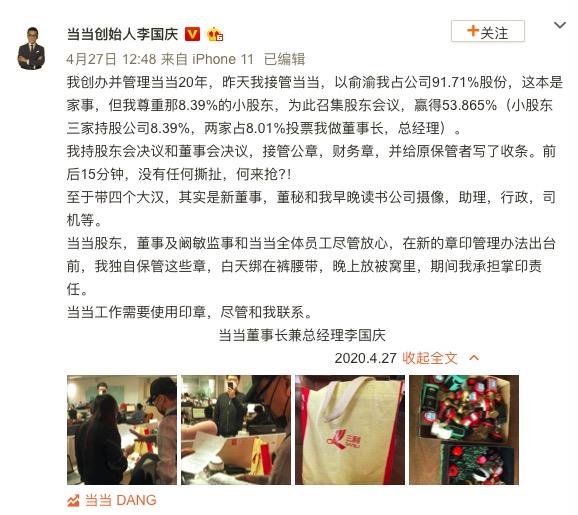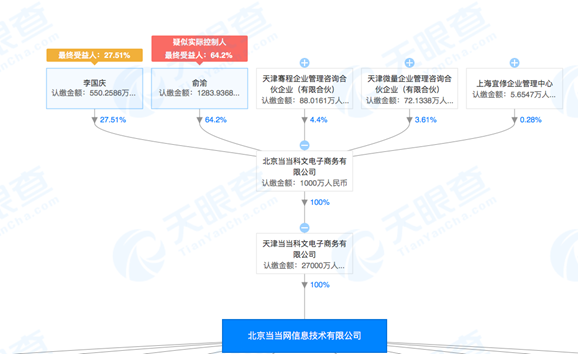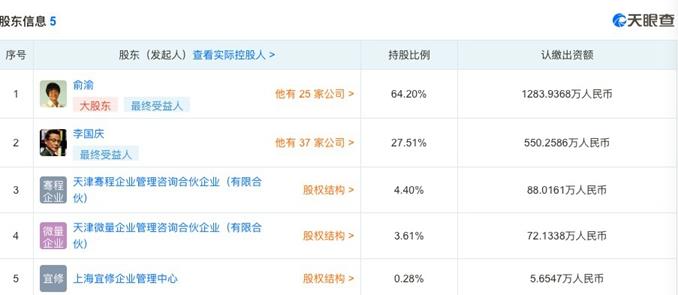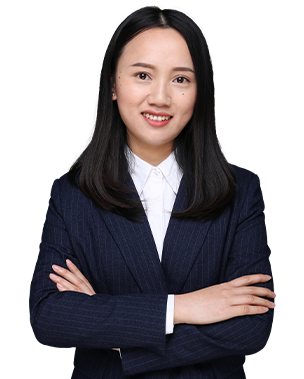DANGDANG network control battles the dragon and the tiger fight
The issue of corporate control is already a cliché, and it is also one of the necessary matters that every entrepreneur should and must consider in the early stage of entrepreneurship, but just when everyone felt good, the incident of Li Guoqing, the founder of Dangdang.com, once again taught everyone a very vivid lesson. For a time, it quickly occupied the headlines of various circles, and everyone also watched this gorgeous "regular palace fight" upgrade to "forcing the palace to seize power".
Dangdang.com's founder, now, actually passed the resolution of the temporary shareholders' meeting and led everyone to seize the official seal to take over the company, which is shocking.
At the same time, the corporate governance and legal cognition reflected behind this incident are worth our deep consideration again.
1. Company control
Check Baidu Encyclopedia, corporate control, refers to economic rights derived from shareholder ownership. It is essentially a new way of interest existence, the product of a conflict of interest. The proper exercise of corporate control has played a key role in promoting the emergence and development of the company's enterprises, which is conducive to establishing a foundation of trust between shareholders and improving the efficiency of the company's operation. It is an evaluation system that characterizes the operation status of the company, and its real value is to maintain the practical interests and reasonable expected interests of all relevant parties in a balanced manner.
The importance of corporate control is self-evident, so under what circumstances can control of a company be assumed?
In the Company Law of China, a controlling shareholder refers to a shareholder whose capital contribution accounts for more than 50% of the total capital of a limited liability company or whose shares account for more than 50% of the total share capital of a joint stock limited company; Although the amount of capital contribution or the proportion of shares held is less than 50%, the voting rights enjoyed by the amount of capital contributed or the shares held by the shareholders are sufficient to have a significant impact on the resolutions of the shareholders' meeting or the general meeting of shareholders. The actual controller refers to a person who is not a shareholder of the company, but can actually control the company's actions through investment relationships, agreements or other arrangements.
The expression of the actual controller in the Administrative Measures for the Acquisition of Listed Companies is that it has control over a listed company under any of the following circumstances: (1) the investor is the controlling shareholder of the listed company holding more than 50% of the shares; (2) Investors may actually control more than 30% of the voting rights of the shares of the listed company; (3) Investors can decide the election of more than half of the members of the board of directors of the company by actually controlling the voting rights of the shares of the listed company; (4) the voting rights of the shares of the listed company that investors have at their disposal are sufficient to have a significant impact on the resolution of the general meeting of shareholders of the company; (5) Other circumstances determined by the CSRC.
2. The process by which Li Guoqing seized control of Beijing Dangdangwang Information Technology Co., Ltd. ("Dangdang.com").

First, convene an extraordinary shareholders' meeting;
Secondly, he deliberated and passed the resolutions of the shareholders' meeting and the board of directors, removed Yu Yu as executive director and general manager, established a new board of directors, and appointed himself as chairman and general manager;
Finally, hold the resolution of the shareholders' meeting and the resolution of the board of directors, and go to Dangdang.com to take over the official seal and financial chapter.
At present, the information of Tianyancha shows that the shareholding structure of Dangdang.com is as follows:


From the equity structure of Dangdang.com, it can be seen that the only shareholder of Dangdang.com is: Tianjin Dangdang Kewen E-commerce Co., Ltd., the only shareholder of Tianjin Dangdang Kewen E-commerce Co., Ltd. is: Beijing Dangdang Kewen E-commerce Co., Ltd., the major shareholder of Beijing Dangdang Kewen E-commerce Co., Ltd. is Yu Yu, then, logically, as long as Tianjin Dangdang Kewen E-commerce Co., Ltd. makes a legal resolution, it is regarded as the shareholders of Dangdang.com to make a legal resolution, and Beijing Dangdang Kewen E-commerce Co., Ltd. makes a legal resolution. It is regarded as the shareholders of Tianjin Dangdang Kewen E-Commerce Co., Ltd. to make a legal resolution, so whether the resolution made by Beijing Dangdang Kewen E-commerce Co., Ltd. is legal is the most important thing.
So, is the resolution made by Beijing Dangdang Kewen E-Commerce Co., Ltd. illegal?
1) Hold an extraordinary shareholders' meeting
Article 39 of the Company Law: Shareholders' meetings are divided into regular meetings and extraordinary meetings.
Regular meetings shall be held on time in accordance with the provisions of the articles of association. If a shareholder representing more than one-tenth of the voting rights, a director of more than one-third of the directors, a board of supervisors or a supervisor of a company without a board of supervisors proposes to convene an extraordinary meeting, an extraordinary meeting shall be convened.
Article 40 Where a limited liability company establishes a board of directors, the shareholders' meeting shall be convened by the board of directors and presided over by the chairman of the board; If the chairman of the board of directors is unable to perform his duties or fails to perform his duties, the vice chairman of the board of directors shall preside; If the vice chairman of the board of directors is unable to perform his duties or fails to perform his duties, a director jointly elected by more than half of the directors shall preside.
If a limited liability company does not have a board of directors, the shareholders' meeting shall be convened and presided over by the executive director.
If the board of directors or executive directors are unable to perform or do not perform the duty of convening a meeting of shareholders, the board of supervisors or the supervisors of the company without a board of supervisors shall convene and preside; If the board of supervisors or the supervisors do not convene and preside, the shareholders representing more than one-tenth of the voting rights may convene and preside on their own.
Article 41 When a meeting of shareholders' meeting is convened, all shareholders shall be notified 15 days before the meeting; However, unless otherwise provided in the articles of association or otherwise agreed by all shareholders.
According to the law, shareholders representing more than one-tenth of the voting rights have the right to propose to convene an extraordinary shareholders' meeting, and Li Guoqing's public information shows that holding 27.51% of the shares has the right to propose an extraordinary shareholders' meeting.
However, there are requirements for the convening and presiding of an extraordinary shareholders' meeting: first the board of directors (or executive directors) presides,---- if the board of directors (executive directors) does not convene or preside, the vice chairman convenes and presides,---- if the vice chairman does not convene or preside, the board of supervisors (or supervisors) convenes and presides,---- and the board of supervisors (or supervisors) does not convene or preside, and only then the shareholders with more than one-half of the voting rights of the representatives convene and preside over by themselves.
According to supervisor Kan Min, Li Guoqing's extraordinary shareholders' meeting did not notify all shareholders, nor did he require Yu Yu, as an executive director, to convene and preside over the meeting. However, screenshots of Li Guoqing's chat with his son released to the media show that Li Guoqing had notified Yu Yu of the extraordinary shareholders' meeting 20 days in advance. Therefore, we cannot judge from the existing materials whether the extraordinary shareholders' meeting convened by Li Guoqing is procedurally legal, nor do we exclude the circumstances otherwise stipulated in the articles of association.
2) Deliberated and passed the resolutions of the shareholders' meeting and the board of directors, and removed and appointed the directors, legal representatives and general managers of Dangdang.com
Article 43 of the Company Law stipulates that the methods of deliberation and voting procedures of the shareholders' meeting shall be stipulated in the articles of association of the company, except as provided in this Law. Resolutions to amend the articles of association, increase or decrease the registered capital, and resolutions to merge, divide, dissolve or change the form of the company at a meeting of shareholders must be passed by shareholders representing more than two-thirds of the voting rights.
According to Li Guoqing, it was held by the board of directors and elected himself as the chairman of the board of directors and removed Yu Yu from the position of executive director, which is a major change to the organizational structure of Beijing Dangdang Kewen E-Commerce Co., Ltd., and the articles of association of the company should be amended, which requires the shareholders' meeting to make a resolution to amend the articles of association according to law. However, according to the Company Law, amendments to the articles of association must be approved by shareholders representing more than two-thirds of the voting rights, but even according to Li Guoqing's own calculation of 53.865% of the equity ratio ("Yu Yu, I account for 91.71% of the company's shares, this is a family matter, but I respect the 8.39% minority shareholders, so I convened a shareholders' meeting and won 53.865% (8.39% of the three minority shareholders held the company, and two accounted for 8.01% to vote me as chairman and general manager) Nor does it meet the two-thirds requirement of the law. Therefore, it cannot be ruled out that the resolution of the shareholders' meeting of Beijing Dangdang Kewen E-Commerce Co., Ltd. is invalid.
In addition, because there may be complex agreements and voting mechanisms such as nominee shareholding and control hidden behind Yu Yu's equity, at the same time, the divorce case between Li Guoqing and Yu Yu has not been clarified, the relevant provisions such as the articles of association of Dangdang.com are not clear, etc., and Yu Yu has not come forward to clarify the equity matter, which makes the incident even more confusing, so it is still not very certain whether the resolution of Beijing Dangdang Kewen E-Commerce Co., Ltd. is invalid.
3. Company seal, legal representative and company control
An important medium for Li Guoqing's seizure of power was several official seals and financial seals that he obtained from Dangdang.com's headquarters.
From the above content, it can be seen that the company's official seal actually has no direct causal relationship with the company's control, not simply who occupies the company's control of the company, but to a certain extent, the company's official seal, financial seal, etc. can be used as proof of the company's independent meaning, and is an important carrier for representing the company externally and conducting business.
At the same time, based on Dangdang.com's statement that "during the period when Dangdang.com and its affiliates' official seals and financial special seals are out of control, any contract, agreement, documents with contractual nature or any other written documents signed by anyone using the official seal or financial special seal will not be recognized by the company." The official seal, financial seal, and financial department seal will be invalid on the same day", then, is the official seal of Dangdang.com controlled by Li Guoqing still valid?
First of all, the official seal needs to be confirmed by external notices such as public announcements and public security registration, and it is not a statement that can be invalidated;
Secondly, Li Guoqing left a receipt for the official seal and told Dangdang.com that it can be used if it needs to be used, so that Dangdang.com's official seal is not lost.
If Dangdang.com fails to successfully report the loss, then the official seal of Dangdang.com controlled by Li Guoqing is still valid, then Li Guoqing controls the official seal, financial seal, bank seal and financial account information of Dangdang.com, which can be said to be equivalent to grasping the key to the company's independent meaning to a certain extent.
What is more confusing is that in this fierce battle for control, Yu Yu, the legal representative who "cooperated" with Li Guoqing's "performance", has not expressed his position so far.
At the same time, according to the current industrial and commercial registration, Yu Yu is still the legal representative of Beijing Dangdang Kewen E-commerce Co., Ltd., Tianjin Dangdang Kewen E-commerce Co., Ltd., and Beijing Dangdangwang Information Technology Co., Ltd.
Then, according to Article 61 of the General Provisions of the Civil Law, in accordance with the provisions of the law or the articles of association of a legal person, the person in charge of engaging in civil activities on behalf of the legal person is the legal representative of the legal person. The legal consequences of civil activities carried out by the legal representative in the name of a legal person shall be borne by the legal person.
If Li Guoqing's formation of the board of directors, the extraordinary shareholders' meeting to elect the chairman of the board, and the board of directors' resolution are invalid, the person in charge of civil activities on behalf of Dangdang.com will still be the legal representative Yu Yu.
However, on April 26, 2020, Li Guoqing also issued an "Announcement" stamped with the official seal of Beijing Dangdang Kewen E-Commerce Co., Ltd., stating that "a company statement without the official seal of Dangdang cannot represent the company". So, who can represent Dangdang.com at this time? The key depends on the effectiveness of the extraordinary shareholders' meeting and the resolution of the board of directors.
4. After marriage, is the equity acquired by one of the investment companies the joint property of the husband and wife? Does one spouse have the right to dispose of the equity held by the other spouse? Is a non-owner entitled to make claims directly against the Company?
1) First of all, several concepts need to be clarified: capital contribution, shareholder voting rights, and equity
A. Amount of capital contribution: The shareholders of a limited liability company shall be liable to the company within the limit of the amount of capital contribution subscribed by the second paragraph of Article 3 of the Company Law; Shareholders of a company limited by shares are liable to the company to the extent that they have subscribed for shares.
B. Shareholders' voting rights: Article 42 of the Company Law, shareholders shall exercise their voting rights in accordance with the proportion of capital contribution; However, unless otherwise provided in the articles of association.
C. Equity: It is a comprehensive right of the shareholders of a limited liability company or a joint stock limited company to enjoy the personal and property rights and interests of the company, and is a transferable right obtained by the shareholders due to capital contribution, participating in affairs according to law or the provisions and procedures of the articles of association, and enjoying property interests in the company.
Article 71 of the Company Law: Shareholders of a limited liability company may transfer all or part of their equity to each other.
Where the articles of association have other provisions on equity transfer, those provisions shall prevail.
D. The proportion of equity held by shareholders is generally consistent with their actual capital contribution ratio, but all shareholders of a limited liability company may also agree not to hold equity according to the actual capital contribution ratio
Supreme People's Court (2011) Min Ti Zi No. 6 [Judgment View]: The registered capital subscribed by shareholders is the basis of the company's capital, but the effective operation of the company sometimes requires other conditions or resources, and under the condition that the company's registered capital meets the statutory requirements, the actual amount of capital contributed by each shareholder and the proportion of equity held by each shareholder should belong to the scope of the autonomy of the company's shareholders. The proportion of equity held by shareholders is generally consistent with their actual capital contribution ratio, but all shareholders of a limited liability company may also agree not to hold equity according to the actual capital contribution ratio, and Chinese law does not prohibit shareholders from making internal agreements on their actual capital contribution amount and equity shareholding ratio.
2) Whether the equity of the company is the joint property of the husband and wife
A. Is the amount of capital contribution stipulated in Interpretation (II) of the Supreme People's Court on Several Issues Concerning the Application of the Marriage Law of the People's Republic of China an equity interest?
Article 17 of the Marriage Law: The following property acquired by husband and wife during the marriage relationship shall be jointly owned by husband and wife: (1) salaries and bonuses; (2) income from production and operation; (3) income from intellectual property rights; (4) property acquired by inheritance or gift, except as provided for in Paragraph 3 of Article 18 of this Law; (5) Other property that shall be jointly owned.
Interpretation of the Supreme People's Court on Several Issues Concerning the Application of the Marriage Law of the People's Republic of China (II)
Article 11: During the period of marriage, the following property is "other property that shall be jointly owned" as provided for in Article 17 of the Marriage Law:(1) Income obtained by one party from the investment of personal property.
Article 16: Where the people's court hears a divorce case involving the division of the amount of capital contributed by one party in the name of the husband and wife in the limited liability company, and the other party is not a shareholder of the company, it shall be handled separately according to the following circumstances: (1) Where the husband and wife agree to transfer part or all of the capital contribution to the spouse of the shareholder, and the majority of the shareholders agree and the other shareholders expressly waive the right of pre-emption, the spouse of the shareholder may become a shareholder of the company; (2) After the husband and wife reach a consensus on matters such as the transfer of the share of the capital contribution and the transfer price, and the majority of the shareholders do not agree to the transfer, but are willing to purchase the capital contribution at the same price, the people's court may divide the property obtained from the transfer of capital contribution. If a majority of the shareholders do not agree to the transfer and are unwilling to purchase the capital contribution at the same price, it is deemed that they have agreed to the transfer, and the spouse of the shareholder can become a shareholder of the company.
There are different views in theoretical circles and judicial practice on the issue of whether equity is the joint property of husband and wife. At present, the mainstream view is that equity is not the joint property of husband and wife, and the identity of shareholders can only be enjoyed by the party holding the shares, and their spouses cannot necessarily enjoy the status of shareholders, but the income and value brought by equity belong to the joint property of husband and wife.
Classic case: Supreme People's Court (2014) Min Er Zhong Zi No. 48
The court held that as a special property right, in addition to the content of property rights and interests, equity also has personality rights and identity rights that are inseparable from the social attributes of individual shareholders, their characteristics and character. Unless otherwise specified, for natural person shareholders, equity still belongs to the scope of private rights within the norms of commercial law, and their specific rights should be exercised independently by the shareholders themselves without interference from others. In terms of equity transfer, the legal transfer subject recognized by China's Company Law is also the shareholder himself, not the family in which he or she belongs. In this case, Zhang Xintian signed an equity transfer agreement with Liu Xiaoping for the transfer of the equity of the industrial and trading company he held, and the two parties engaged in the civil transaction activity, the civil subject was qualified, the meaning was true and clear, the content of the agreement did not violate the mandatory provisions of China's Contract Law and the Company Law, and the equity transfer agreement should be deemed valid. Aimee and Zhang Xintian's grounds of appeal have no legal basis and this court does not support them.
Assuming that there is no complex voting mechanism such as equity nominee holding agreement and control agreement behind Yu Yu's equity, and the divorce case between Li Guoqing and Yu Yu has not reached an agreement or judgment on the equity at this stage, then, in this case, Li Guoqing believes that "Yu Yu I account for 91.71% of the company's shares, this is a family matter, but I respect the 8.39% of the minority shareholders, so I convened a shareholders' meeting and won 53.865% (the three minority shareholders held 8.39% of the company, and two accounted for 8.01% to vote me as the chairman, General manager)"Naturally, it is not true.
But would Li Guoqing make such a mistake?
At present, we do not know about this, but we know that everyone should take a good look at the shareholding structure, articles of association, etc., and please keep the company's official seal properly. At the same time, for company operators, we recommend that the company's business development and the interests of employees and creditors should not be affected by marriage and family disputes.
(This article is translated by software translator for reference only.)
Related recommendations
- Tax lawyers review the draft of the revised Tax Collection and Administration Law for soliciting opinions
- New Measures for Punishing "Dishonesty" by the Supreme People's Court at the Two Sessions in 2025 (Part 3): "Height Limit" Single Release Mechanism
- New Measures for Punishing "Dishonesty" by the Supreme People's Court at the Two Sessions in 2025 (Part 2): Grace Period System
- Interpretation of the Management Measures for Compliance Audit of Personal Information Protection - Feeling the Rhythm and Rhythm of Regulatory Flow




